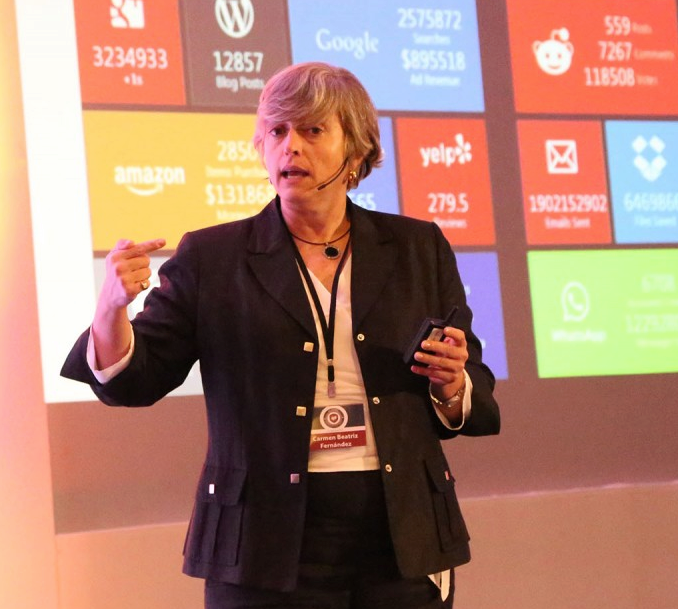Small classes are a luxury
News

“Small classes are a luxury” – Guest Professor Carmen Beatriz Fernández Pérez from Universidad de Navarra
This semester, Professor Carmen Beatriz Fernández Pérez is a first time guest professor at the Business School Pforzheim. Specialized in political campaigning and communications, she teaches a course on “Campaigning and Narrative Communication” in the Master’s program. In the interview with student reporters Svenja Maurer and Ronja Baier she talks about teaching face-to-face again, the differences between Pforzheim and Navarra and her current research.
Prof. Fernandez, it is your first time teaching here in Pforzheim. How do you like it?
I like it very much. I like the university and the experience. I am teaching a small class, which I didn’t expect but it’s a luxury, because you have the opportunity to give individual attention and that’s very good. I also liked walking around Pforzheim, this city has a very special inflection point in its history that is very clearly noticeable. But besides that it has a wonderful environment, it is an interesting and very particular city.
Luckily, you did not have to give the lecture online. How does it feel to be on campus and to meet all students and colleagues personally?
That is very important, especially after having so many months with this kind of mixed education. In Navarra we had classes on campus but only half of the regular time. So it is a very satisfactory thing to be teaching face-to-face again. Also for you as students, I think! And mostly for younger students. They cannot have the real university experience without onsite classes – not just the classes but also beyond teaching, the environment like meeting with fellow students is a very important part of what university means.
Can you tell us about the differences between your home university and here?
I have two home universities because I am from Venezuela, where I teach in an MBA program at IESA and the University of Navarra where I have been teaching for the last six years. But I am still teaching in Venezuela, too. I teach very different things. The MBA in Venezuela reminds me more of this program here in Pforzheim but in Navarra I teach “Political System” and “Political Communication on the Internet” for Bachelors. So it is a very different experience, the students are younger and the groups are bigger. Besides it is more of an international and multicultural environment in Navarra, because the people studying for a diploma in International Relations come from very different parts of the world, probably from about 20 to 25 different countries.
You have a degree as urban planner, an MBA in Finance, but also a Master’s degree as well as a PhD with a focus on political campaigning. Since these are quite different topics, why did you decide to specialize on political campaigning and communications?
What you learn from different stages in life is that at the very end everything is connected. Being an urban planner I was very interested in politics. An urban planner needs to understand cities and city management, public opinion and politics so it is related to political campaigning. Only the MBA in Finance is a little bit different. I wanted to study Public Policy but at that time there was no program at my university. So I studied the MBA in Finance – but with the focus on Public Policy.
You have currently finished your PhD project with a focus on the role of social media in political communications and election campaigns. What fascinates you about this topic and why do you think it is important?
I have been working with cyber politics from the beginning of time, even when the web was still black and white, not colored like nowadays. Around 30 years ago, when the internet was developed, screens were dark green. So when I started my masters in campaigning in the U.S., I did one final project on the possibilities of cyber politics. I was interested in this topic since 1997, a long time ago. When I established my consulting company DataStrategia, we started working with cyber politics, databases and social media. All that time, we have been doing the practical work. Now I am able to see the things from the other, the academic side. So it was a natural evolution for my dissertation and research. I have done research on explaining the cyber pessimistic view of society. There is a strong argument on the table these days that cyber politics and social media are damaging democracy. What I have done is to try to assess if there is a causality between cyber politics and the damage of democracy. And the answer is no, it is interesting that these findings are against the dominant narrative.
Do you have any final advice that you would give our students for their student lives or personal development?
Maybe an advice related to storytelling, because that’s what I am teaching here. Stories have been among us in politics for many years but now there is a strong interest also from the commercial and cross-marketing side, because stories are a very powerful way to connect the two strategic advices regarding who and how. Who is your target, who are you talking to? And what you are saying to them, what is the message? The narrative and storytelling is a powerful tool for delivering this strategic duo. So keep an eye on narratives and storytelling, they are important in the field of communications, and everywhere
Thank you very much, Professor Fernández Pérez.
Universidad de Navarra was founded in 1952 by St. Josemaría Escrivá de Balaguer, founder of Opus Dei, which is a prelature of the Catholic church. The university is a Christian-inspired institution that carries out its teaching, research and healthcare as a non-profit organization. With seven campuses it has consistently been ranked as the best private university in Spain. Most faculties are located in Pamplona while the IESE Business School is based in Madrid, Barcelona, New York, Munich and São Paulo. The sixteen schools include a teaching hospital, eight research centers as well as two museums. More than 12,000 students take part in 38 undergraduate degrees, 42 masters and 20 doctoral programs, including bilingual degrees and double degrees. Currently there are more than 3,500 international students from 109 nationalities worldwide studying at Universidad de Navarra.
Instituto de Estudios Superiores de Administración (IESA) is a venezuelan business school that has four international excellency seals. Only seven Latin American schools and less than 1% of the business schools worldwide have this distinction in management education: Association to Advance Collegiate Schools of Business (AACSB), EFMD (European Foundation for Management Education), Association of MBAs (AMBA) and Network of Schools of Public Policy, Affairs, and Administration (NASPAA).


